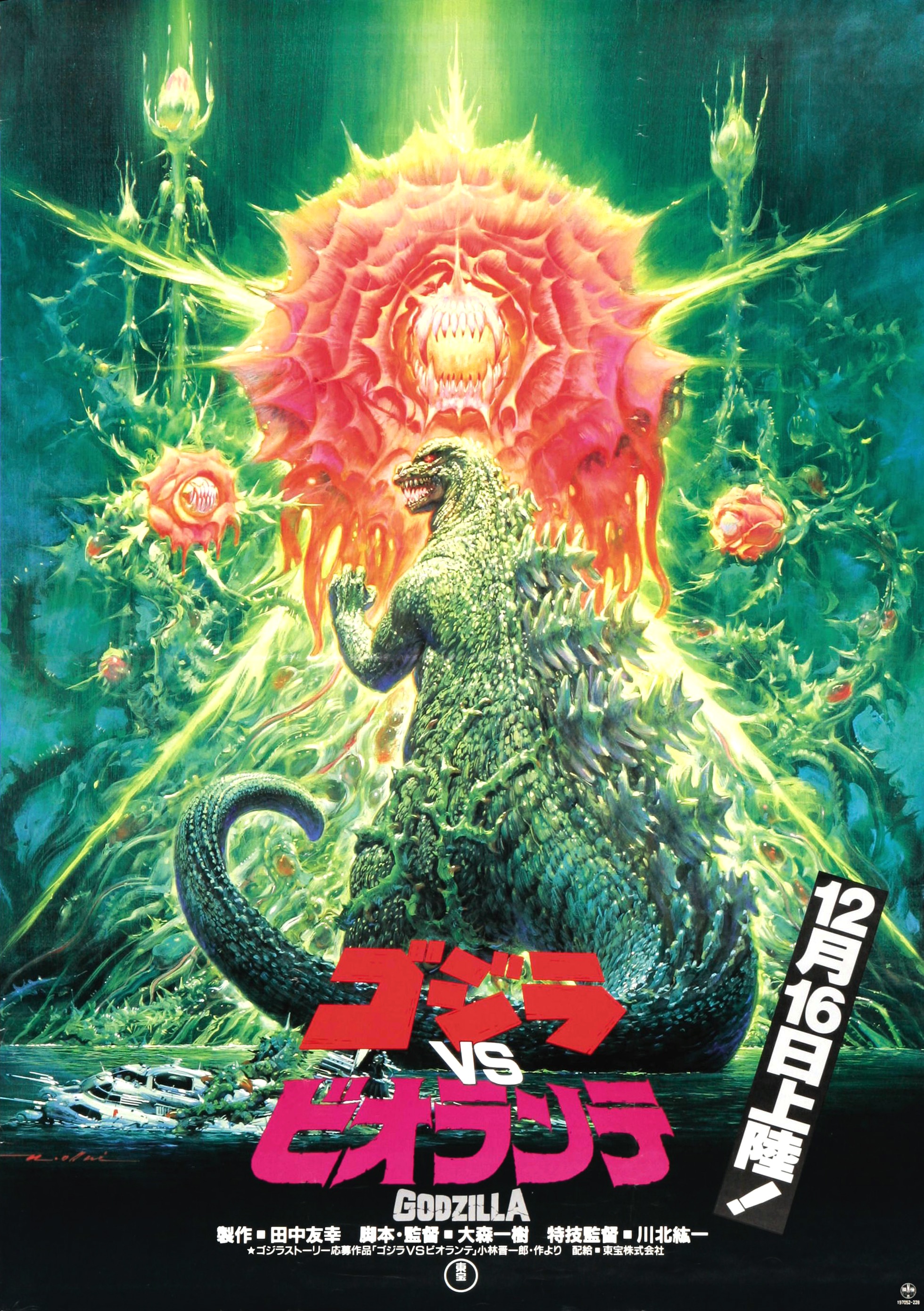ゴジラVSビオランテ
Godzilla vs. Biollante

Stats & Staff
Release: December 16th, 1989
Produced by: Tomoyuki Tanaka & Shogo Tomiyama
Written by: Shinichiro Kobayashi & Kazuki Omori
Directed by: Kazuki Omori & Koichi Kawakita
Composed by: Koichi Sugiyama
Runtime: 104 minutes
Appearances
Monsters: Godzilla (3rd Generation), Biollante
Mecha: Super X2, Maser Cannon (MBT-MB92)
Story
Synopsis: The night of Godzilla's return trip to Tokyo, various forces attempt to obtain tissue samples of the monster. Japan of course obtains some, but so does SSS7, a spy from the Middle Eastern country of Saradia. The Japanese expat Dr. Shiragmi arrives at a Saradian lab the following morning to examine the material, only for it to be destroyed in a bombing committed by the American corporation Biomajor, which also kills the doctor's daughter, Erika. Five years later, Dr. Shiragami is back in Japan, and premonitions from the children at the Psychic Research Center, including the most gifted among them, Miki Saegusa, predict the return of Godzilla. Of the options to deal with the monster proposed, one with the most promise is the Anti-Nuclear Energy Bacteria, a genetically engineered species of bacteria that would be able to take the radiation metabolizing genes from Godzilla's DNA and use it to inhibit the monster's ability to do so. In opposition to this plan is Dr. Kirishima, who points out that not only could such an organism be used to stop Godzilla, but nuclear weapons as well, leading to an end to the era of mutually assured destruction and throwing the Cold War into complete chaos. Despite this, Dr. Shiragami agrees to work on the project, but secretly uses the Godzilla cells to merge them with a rose containing some of the DNA of Erika, inadvertently creating the monster Biollante. Biomajor issues an ultimatum to Japan, that if it doesn't hand over the A.N.E.B. they will release Godzilla from Mt. Mihara, and while the terms are agreed to, an ambush from SSS7 leads to both the A.N.E.B. being stolen and Godzilla being released. Godzilla then engages with the sequel to the Super X as he instinctively seeks out Biollante, who is, as Dr. Shiragami describes it, "the same creature." After successfully recovering the A.N.E.B., Godzilla is dosed with the bacteria, but at the cost of the new Super X 2 and the life of Colonel Gondo. Eventually, after an experimental military operation and another battle with Biollante, the A.N.E.B. finally takes effect. Godzilla retreats to the sea, and Biollante disappates into space with the spirit of Erika finally leaving it. Dr. Shiragami is assassinated by SSS7 in order to prevent him from ever making more of the bacteria, despite him having sworn off of doing so mere moments before.
Theme: This is mankind's greatest work. On the surface, this movie is about Cold War tensions and genetic engineering, but that's just the set dressing, that's not the point. The actual monster here isn't Godzilla or Biollante, it's the A.N.E.B., as that alone could do far more damage that both combined. Omori - in this landmark for the series that would go onto dictate the tone and themes for the entire rest of the franchise - took Kobayashi's original story about grief leading into a strange Frankenstein story about an abstract flower woman into something truly terrifying. The problem is that the peace of the Cold War was predicated on the idea that, if one nuclear power opened fire, then so would the other, leading to an escalating nuclear exchange that could doom all life on Earth. The A.N.E.B., used as a weapon, gives countries - any country, they don't have to be a nuclear power - the ability to take away the nuclear arsenal from another. This would dismantle the doctrine of mutually assured destruction and allow nuclear powers to unleash their arsenals without fear of retaliation. What's so terrifying about this scenario in the film is that you, the viewer, realize at the same speed as the characters that this is not a "what if" scenario; if this technology were available, this would be how humans would use it, full stop. And by making this point about the "peace" of the Cold War being predicated on lies, that the reality is mankind can and will destroy everything even when it knows better, the theme of the film reverberates much further than the initial premise. It also introduces the recurring theme of "recursive mistakes," which is the notion that the only reason that A.N.E.B. exists in the first place is to solve another problem humans created, Godzilla, creating an endless feedback loop where even well intentioned people trying to right the mistakes of the past create progressively more dire situations either as a result of their own selfishness or the fact that no matter what those well intentioned people do, the worst in mankind will find a way to make things worse. This is, at it's heart, the core idea behind the film, and the reason it will always be relevant. No matter how long its been since the World Wars, or the Cold Wars, or anything else, Biollante will still ask, how long have we been living in such an age? The answer, of course, is that if we keep doing the same things, we can't call it a new era.
English Versions
Godzilla vs. Biollante (November 25th, 1992): Uncut international export dub by Omni Productions in Hong Kong. Produced in 1990, the release was delayed after a legal battle between Toho and Miramax.